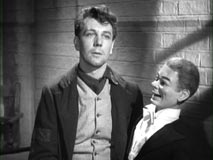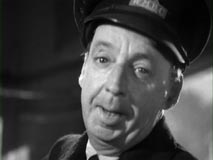|
Newest Reviews:
New Movies -
The Tunnel
V/H/S
The Tall Man
Mama Africa
Detention
Brake
Ted
Tomboy
Brownian Movement
Last Ride
[Rec]≥: Genesis
Hara-Kiri: Death of a Samurai
Indie Game: The Movie
Abraham Lincoln: Vampire Hunter
Old Movies -
Touki Bouki: The Journey of the Hyena
Drums Along the Mohawk
The Chase
The Heiress
Show
People
The Strange Affair of Uncle Harry
Pitfall
Driftwood
Miracle Mile
The Great Flamarion
Dark Habits
Archives -
Recap: 2000,
2001, 2002,
2003, 2004
, 2005, 2006,
2007 , 2008
, 2009 ,
2010 , 2011 ,
2012
All reviews alphabetically
All reviews by star rating
All reviews by release year
Masterpieces
Screening Log
Links
FAQ
E-mail me
HOME
| |
Dead of Night (Cavalcanti, Crichton, Dearden, &
Hamer, 1945)
 Though quite obviously possessing both
structure and content that has been
influential to its genre, thereís something about the British horror anthology
Dead of Night that makes it fail to rise very far above its legions of
imitators. The picture begins as an architect arrives at an estate, only to
discover that the place, and each of its inhabitants, has previously haunted him
in a recurring nightmare. As he slowly recalls premonitions from that dream, the
group begins recounting their own previous brushes with the supernatural, each
of which is detailed within an episodic flashback. A skeptical psychoanalyst
attempts to explain each of the tales away with scientific theory, but as more
of the architectís predictions come to be, suspense builds and a sense of
dread becomes more palpable among them. With a connecting story thatís far
more elaborate and clever than that of earlier macabre tale collections like Waxworks,
and frequent bouts of witty repartee, Night ostensibly is the
sophisticateís horror film, but that works against it. Since theyíve been so
thoroughly polished with taste and production values, the anecdotes are far less
frightening than they might otherwise have been. Then again, Japanese Director
Masaki Kobayashiís eerie Kwaidan is even more lavishly produced than Dead,
but still manages to unsettle viewers, so perhaps the presence of good taste is
not alone to blame. Though quite obviously possessing both
structure and content that has been
influential to its genre, thereís something about the British horror anthology
Dead of Night that makes it fail to rise very far above its legions of
imitators. The picture begins as an architect arrives at an estate, only to
discover that the place, and each of its inhabitants, has previously haunted him
in a recurring nightmare. As he slowly recalls premonitions from that dream, the
group begins recounting their own previous brushes with the supernatural, each
of which is detailed within an episodic flashback. A skeptical psychoanalyst
attempts to explain each of the tales away with scientific theory, but as more
of the architectís predictions come to be, suspense builds and a sense of
dread becomes more palpable among them. With a connecting story thatís far
more elaborate and clever than that of earlier macabre tale collections like Waxworks,
and frequent bouts of witty repartee, Night ostensibly is the
sophisticateís horror film, but that works against it. Since theyíve been so
thoroughly polished with taste and production values, the anecdotes are far less
frightening than they might otherwise have been. Then again, Japanese Director
Masaki Kobayashiís eerie Kwaidan is even more lavishly produced than Dead,
but still manages to unsettle viewers, so perhaps the presence of good taste is
not alone to blame.
 Due to Dead of Nightís plot
structure, the viewer is made acutely aware that the narrator of each tale must
have survived whatever horrors they faced. As a result, thereís something a
bit inappropriately comforting about the approach, and it undermines much of the
terror. Worse still, a slightly humorous story about a haunted golfer does
precisely what its teller intends to do: kills the spooky mood. If the film
doesnít quite manage to steadily increase in tension, at least itís
successful in fits and starts. The vengeful ghosts, killer dolls, and
flirtations with death make for inherently exciting material, and itís tough
to declaw it entirely. Nonetheless, there are times when the movie doesnít
seem fully engaged by itself. Because the cameras never linger on anything long
enough for boredom to set in, the film doesnít test patience, but thereís a
whiff of wasted potential floating about, and that disappoints.
Ultimately, thereís the sensation watching Dead of Night that
the countless spin-offs that itís inspired in film and television have sapped
away most of the freshness that it once had. Though very little here doesnít
work on its own terms, knowledge of other films in the horror genre will
undoubtedly reduce any surprise that it has to offer. Countless scenes are
effective enough to move things along, and the looping, nested narrative is a
doozy, but the only sequence that still truly wows is the wild, surreal climax.
Itís odd, and somewhat disappointing, that more of the films that ripped this
one off havenít incorporated avant-garde touches as well as this one does in
its final moments. Due to Dead of Nightís plot
structure, the viewer is made acutely aware that the narrator of each tale must
have survived whatever horrors they faced. As a result, thereís something a
bit inappropriately comforting about the approach, and it undermines much of the
terror. Worse still, a slightly humorous story about a haunted golfer does
precisely what its teller intends to do: kills the spooky mood. If the film
doesnít quite manage to steadily increase in tension, at least itís
successful in fits and starts. The vengeful ghosts, killer dolls, and
flirtations with death make for inherently exciting material, and itís tough
to declaw it entirely. Nonetheless, there are times when the movie doesnít
seem fully engaged by itself. Because the cameras never linger on anything long
enough for boredom to set in, the film doesnít test patience, but thereís a
whiff of wasted potential floating about, and that disappoints.
Ultimately, thereís the sensation watching Dead of Night that
the countless spin-offs that itís inspired in film and television have sapped
away most of the freshness that it once had. Though very little here doesnít
work on its own terms, knowledge of other films in the horror genre will
undoubtedly reduce any surprise that it has to offer. Countless scenes are
effective enough to move things along, and the looping, nested narrative is a
doozy, but the only sequence that still truly wows is the wild, surreal climax.
Itís odd, and somewhat disappointing, that more of the films that ripped this
one off havenít incorporated avant-garde touches as well as this one does in
its final moments.
* * *
05-20-03
Jeremy Heilman
|